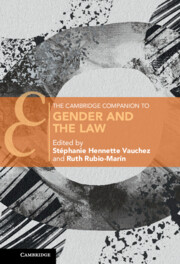Book contents
- The Cambridge Companion to Gender and the Law
- Cambridge Companions to Law
- The Cambridge Companion to Gender and the Law
- Copyright page
- Contents
- Contributors
- Introduction
- Part I Bodies
- 1 The Sexed Subject
- 2 The Foetal Subject
- 3 The Terrorized Subject
- 4 The Sexual Subject
- Part II Functions
- Part III Communities
- Index
2 - The Foetal Subject
Law, Gender and Embodiment
from Part I - Bodies
Published online by Cambridge University Press: 19 January 2023
- The Cambridge Companion to Gender and the Law
- Cambridge Companions to Law
- The Cambridge Companion to Gender and the Law
- Copyright page
- Contents
- Contributors
- Introduction
- Part I Bodies
- 1 The Sexed Subject
- 2 The Foetal Subject
- 3 The Terrorized Subject
- 4 The Sexual Subject
- Part II Functions
- Part III Communities
- Index
Summary
Reference to embodiment is increasingly visible in legal scholarship, where it is assigned a number of meanings. At times it is employed descriptively to mean the fleshiness of the human condition, indistinguishable from reference to the body or corporeality. Elsewhere, it is used to signify something more than this fleshiness: in part, a challenge to the mind/body split that has haunted legal thought and practice. Finally, for a growing number of legal scholars, it refers to the experience of our corporeality at the intersection of discourses and institutions. While a theoretically richer account of our lives as ‘bio-social’1 beings is impacting on legal scholarship, what embodiment might mean with regard to the specific discourses and institutions of law and legal scholarship is only just beginning to be explored.2 In response, this chapter sets out to clarify and develop a clear understanding of legal embodiment; that is, the particular place of law in processes and practices of embodiment. In doing so, it identifies the body as an important site where law and gender entwine in processes that construct legal subjects.
- Type
- Chapter
- Information
- The Cambridge Companion to Gender and the Law , pp. 61 - 97Publisher: Cambridge University PressPrint publication year: 2023
- 1
- Cited by

